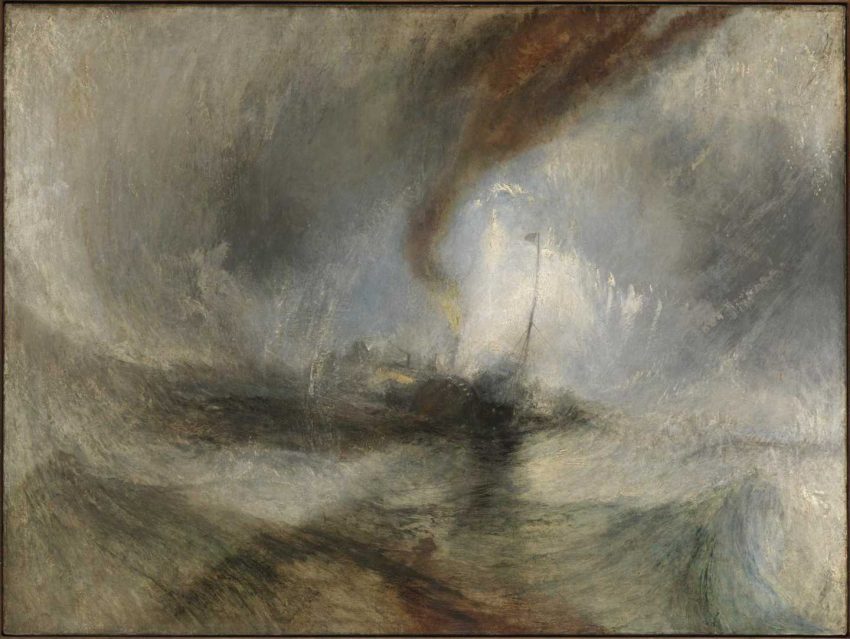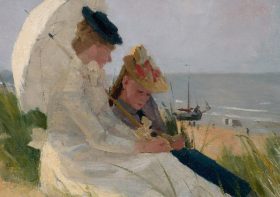Adrift, How Our World Lost Its Way

Joseph Mallord William Turner
Snow Storm – Steam-Boat off a Harbour’s Mouth (exhibited 1842)
Tate
“I was born hale and healthy into the arms of a dying civilization, and I have spent my whole life feeling that I am surviving, with no credit or blame, while around me so many things were falling into ruin; like those characters in films who walk down the streets where all the walls are crumbling and yet emerge unscathed, shaking the dust from their clothes, while behind them the entire city is no more than a pile of rubble.” This is how Amin Maalouf describes his life during his time in Beirut.
Amin Maalouf, a renowned French author of Lebanese descent, has gained global recognition for his works of historical fiction, essays, and non-fiction. In 1993 he received the Prix Goncourt for his novel “The Rock of Tanios”. In his latest book “Adrift: How Our World Lost Its Way,” published in 2020, he vividly recounts his personal experiences of living in Lebanon. Maalouf was born into a Christian family in Beirut in 1949 and spent much of his childhood in Cairo, Egypt. He later moved to France, where he studied sociology and economics at the Ecole des Hautes Etudes Commerciales. Maalouf began his career as a journalist, working for various newspapers and magazines before turning to writing full-time. He longs for a simpler world. A world where people treated “others” with respect. A world he was born into, a universe he calls “the Levant.”
The term “Levant” refers to a geographic region in the eastern Mediterranean, which includes countries such as Lebanon, Syria, Jordan, Israel, Palestine, Cyprus, and parts of Turkey and Egypt. The thing that made the Levant exceptional in Maalouf’s mind is the ability people had to live with one another in close quarters.
“If citizens of different nations and the followers of monotheistic religions had continued to live together in this part of the world and had managed to pool their fates, humanity as a whole would have had an eloquent beacon of peaceful coexistence and prosperity to inspire and light the way. Regrettably, what happened was the reverse, hatred prevailed and an inability to live together became the rule. The enlightenment of the Levant guttered out. Then shadows spread across the globe.”
Having been a journalist for years, he tracks global events with great attention. In “Adrift,” he attempts to unravel the significant historical events that have led to our current state of the world. In a timeline that goes back to the First World War and continues till recent years, he looks back at the key events that led us to our present world of conflict, with regret, nostalgia, and melancholy.
“Beginning with the political and moral upheaval that rocked the Arab world. The Suez crisis in 1956, the Israeli attack in 1967, the Arab defeat and despair, which were then aggravated by the conservative revolutions in both East and West that began around 1979; until finally the events of September 11, which sent the whole world into a “tailspin”, setting off the chain reaction that is now leading us into the unknown- and most likely towards disaster.”
“Adrift” is full of historical details and lucid explanations of the events like the great fire and the Egypt Revolution which led to the long reign of Gamal Abdel Nasser, the issue of Arab unity, and the origins of the Israel-Palestine conflict in the Middle East and the near-impossible task of achieving lasting peace in the region and how the intricate links between power, religion, and nationality, complicates everything.
1979: A year that Amin Maalouf calls “the year of the great reversal”. It was a year when numerous parallel political and social events took place all around the world.
In 1979, a conservative revolution swept across various parts of the world. In the aftermath, socially conservative and politically radical governments took hold of power. In the United Kingdom, Margaret Thatcher was elected, while in the United States, Ronald Reagan overthrew Carter. In Europe, a significant event was the appointment of the first non-Italian Pope, Jean-Paul II, as the head of the Catholic Church. Meanwhile in Iran, Khomeini’s version of a revolutionary, traditionalist Islam, in the name of the poor and wretched of the earth, spread throughout the world, taking on many forms and followed by other revolutions in the twentieth century.
The Soviet Union progressed through the region, prompting armed militias to take up arms in a holy war against the enemies of Islam. The United States seized the opportunity to provoke Moscow by supporting the Mujaheddin in a mission known as “Cyclone,” with the aim of creating a Vietnam War-like situation for Russia. Sanctions against Russia were imposed, with several countries that had suffered under communism joining the cause, including Saudi Arabia, which provided financial support for the Mujahedin. Among the individuals who joined the Mujahedin was a 22-year-old Arab student, Osama Bin Laden.
He is a vocal critic of colonialism and its impact on the region. In his book “The Crusades Through Arab Eyes,” he describes the Crusades as a form of colonialism and argues that the legacy of the Crusades is still felt in the Middle East today. However, he also believes that the conservative revolution had a positive impact on the world by promoting free trade and bringing prosperity to nations. He believes that during the cold war, it was not wrong of the US and other countries to oppose Soviet communism, which ultimately failed and caused misery around the world. However, the moral failure of the invaders and their greed left the countries in a corrupt and disastrous state.
The conservative revolution has also led to the rise of identity politics. People are searching for a sense of “US” in all the wrong places. Globalization and mass immigration have left newly formed nations with no common ancestors and no national narratives. They may have common values, but it has been shown it cannot hold. For example, in the United States even after the election of Obama, racial tension still exists. Religion alone cannot hold nations together. Partitions between different cultures and people with a wall could only lead to disaster, as we have seen in the case of India and Pakistan in the past. So, what is the answer? What is the glue that holds nations together? Amin Maalouf is curious to find an answer. While not necessarily advocating for empires,
“he regrets the disappearance of a particular mindset that existed in the time of empires, one that considered it normal and acceptable for people to be part of a single political entity without necessarily sharing the same religion, the same language, or even the same history.”
Amin Maalouf credits the United States when it helped rebuild Europe with the Marshall Plan after World War II and made efforts to promote democracy in post-war Japan. But in 2013 when the Syrian government used chemical weapons against its own people, the Obama administration did not respond, which Maalouf views as a failure to act in the face of a humanitarian crisis.
In his opinion, the United States has lost its legitimacy to serve as a global example, particularly since the era of Gorbachev when the US had the opportunity to either assist a nation in standing up on its own or to destroy it. Now it is Europe’s responsibility to lead by example. Despite his criticism of Europe in the past, Maalouf still retains hope that the Western world, can and should live by example.
Amin Maalouf traveled across the world as a journalist. He has seen things and observed them with a curiosity of a historian and in his book Adrift, expresses his worries about the world. The situation is alarming. Reading Amin Maalouf, you may sometimes question his arguments, but one thing that undoubtedly dominates his thinking is the importance of “empathy” in our modern world and the need to think about it and act upon it. He believes with that, and a little moral compass, we may find our way out of this chaos that we live in today.


